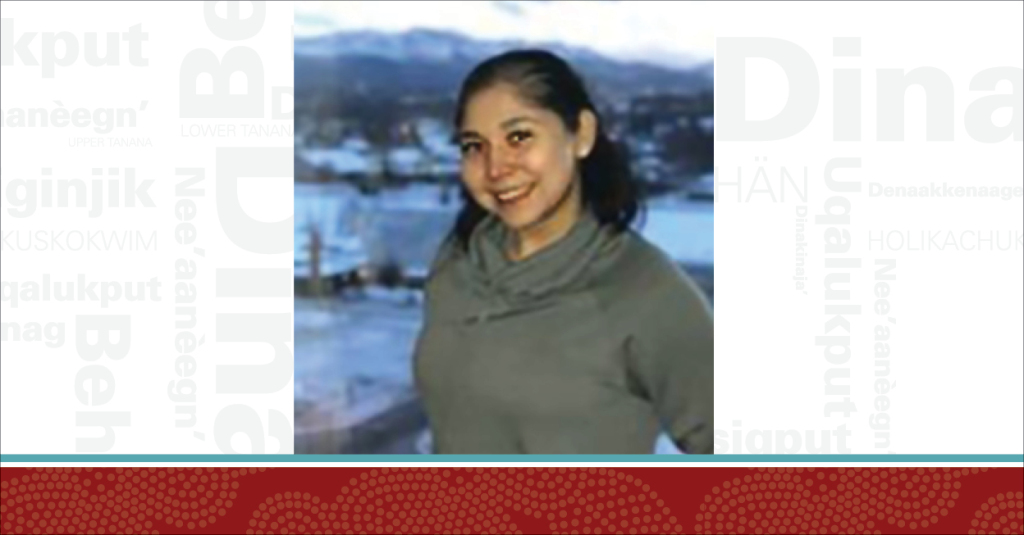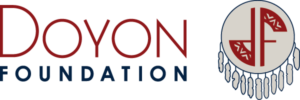“Language is a proactive, powerful way to stay connected to your identity and culture”
– Renee Linton

Renee Linton is the daughter of Peggy Nicholas of Fairbanks and granddaughter of Harriet (Maillelle) Nicholas of Anchorage and Wilbert Nicholas, Sr. Renee’s mother and grandparents originally are from Holikachuk, also known as Grayling. Renee’s family includes two sisters, Andrea Clemens and Melanie Bienek, both of Fairbanks, and a brother, Lawrence Jerod Dunlop, serving with the Marines in California.
Renee acknowledges the encouragement of her uncles, Gary Nicholas, Wilbert Nicholas, Jr., Nick Nicholas, Sr. and Eric Nicholas, all of Anchorage, and her late uncle, David Nicholas. “My mother was a single parent,” Renee recalled, “and at one time or another all of my uncles took the role of a positive adult male figure in my life.”
Renee attended the University of Alaska Fairbanks and is a rural economic specialist with Tanana Chiefs Conference. Her language is Holikachuk, an Athabaskan language spoken in Holikachuk on the Innoko River.
Doyon Foundation: Your perspective on language learning encourages people to just start — to not wait for a perfect time.
RL: We have today and tomorrow — yesterday is already gone. Right now is the best time to be proactive in learning and teaching your traditional language.
We do not want our language to disappear. Speak up and promote whatever language you or your family identify. Tell the world that our goal and our passion is to keep our language alive and strong.
DF: What are some memories of learning Holikachuk?
RL: My Uncle Eric, my mother’s youngest brother, helped raise my sister and me, and he was an amazing storyteller. He taught us a few words and made us proud to be who we are. He helped us stay connected to traditional knowledge while we grew up in Fairbanks.
Looking back, I wish I had put more effort into learning the language when I was younger. I think it would have been easier to remember words and phrases in elementary or middle school.
DF: How do you stay involved in your language? What activities do you recommend?
RL: To keep language alive and vivid, it’s important to work it into your everyday life. People who are active on social media could start sharing words and phrases so they’ll start looking more familiar and less daunting. Post, tweet, Snap and Insta your favorite words, quotes, poems or phrases. Encourage others to do the same.
I like looking up words in the dictionary and I like to read traditional stories printed in both English and Athabascan. I’m starting to write poetry in Holikachuk. I find it’s a really healing and freeing practice that gives me strength to face everyday obstacles.
DF: You’re right — language learners need encouragement. Where should they look?
RL: I feel the need to make my ancestors proud by always trying my best, to be thankful for everything I have.
Language is a proactive, powerful way to stay connected to your identity and culture. It reminds me where my ancestors came from. It instills traditional values that I identify with.
About Doyon Languages Online
Through the Doyon Language Online project, Doyon Foundation is developing introductory online lessons for Holikachuk, Denaakk’e (Koyukon), Benhti Kenaga’ (Lower Tanana), Hän, Dinjii Zhuh K’yaa (Gwich’in), Deg Xinag, Dinak’i (Upper Kuskokwim), Nee’anděg’ (Tanacross) and Née’aaneegn’ (Upper Tanana). The project officially launched in summer 2019 with the first four courses, now available for free to all interested learners.
Doyon Languages Online is funded by a three-year grant from the Administration for Native Americans (ANA), awarded in 2016, and an additional three-year grant from the Alaska Native Education Program (ANEP), awarded in 2017.
As Doyon Foundation continues to grow our language revitalization efforts in the Doyon region, we believe it is important to recognize people who are committed to learning and perpetuating their ancestral language. We are pleased to share some of these “language champion” profiles with you.
If you know a language champion, please nominate him or her by contacting our language program director at foundation@doyon.com. Language champions may also complete our profile questionnaire here. You may learn more about our language revitalization program on our website, or sign up to access the free Doyon Languages Online courses here.
